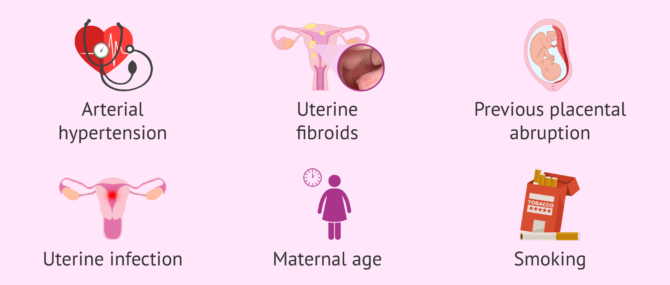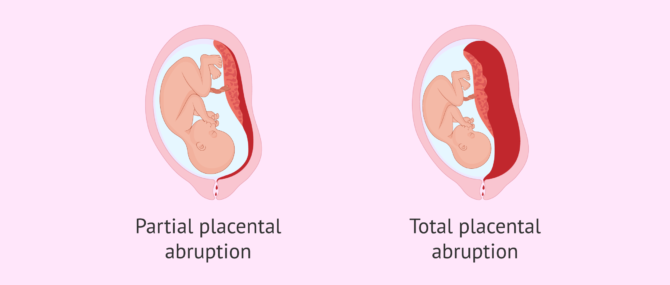The placenta is a fundamental organ in pregnancy, since it constitutes the vital connection between the baby and the mother. The formation of the placenta begins at the same time as the implantation of the embryo in the uterine wall.
When a total or partial separation of the placenta occurs before delivery, it is known as placental abruption. This gestational complication usually occurs at the end of the third trimester of gestation. Depending on the magnitude and severity of placental abruption, there are three grades for this complication in pregnancy, with grade 1 placental abruption being the most common.
The exact cause of placental abruption is unknown, although there are some risk factors for the placenta to separate prematurely.
Provided below is an index with the 8 points we are going to expand on in this article.
- 1.
- 1.1.
- 2.
- 3.
- 4.
- 5.
- 5.1.
- 5.2.
- 5.3.
- 5.4.
- 6.
- 7.
- 8.
What is the placental abruption?
Placental abruption, also known as abruptio placentae or placental abruption, is a detachment of the placenta from its normal place of implantation in the uterine wall before delivery has occurred. Normally, the placenta is delivered after the fetus is delivered during labor.
The incidence of placental abruption is 1 in every 100 pregnancies and it usually occurs in the third trimester of pregnancy, although it can occur at any time after approximately the 20th week of pregnancy. It is, therefore, a rare gestational complication.
Since the placenta is responsible for carrying the nourishment provided by the mother to the fetus, if the placenta begins to detach it can be a serious threat to the life of both the mother and the fetus. The baby may stop receiving needed oxygen and nutrients; while the mother may suffer life-threatening hemorrhage.
Symptoms of abruptio placentae
The main signs of placental abruption are vaginal bleeding and intense uterine contractions. The amount of bleeding will vary according to the amount of placenta detached. For example, if there is a mild placental abruption, the bleeding will be light. On the other hand, if there is a high placental abruption, bleeding will be abundant.
Other symptoms associated with placental abruption in pregnancy are listed below:
- Abdominal pain.
- Drop in blood pressure.
- Uterine sensitivity.
- Back pain.
- Feeling less of the baby's movements.
Sometimes, pregnant women do not feel discomfort even though they are experiencing placental abruption. In these cases, placental separation is detected incidentally when an ultrasound scan is performed.
Causes of placental abruption
The causes of placental abruption are not well known, but it is usually associated with several factors such as: maternal hypertension or pre-pregnancy, premature rupture of certain membranes, external trauma, cocaine use or the presence of uterine fibroids.
Other risk factors for this gestational complication include the following:
- Previous placental abruption.
- Infection inside the uterus.
- Age of the woman over 40 years old.
- Smoking.
- Lack of oxygen to the placenta.
In addition, uterine abnormalities, blood clotting disorders and a high number of previous deliveries also increase the risk of placental abruption.
Classification of placental abruption
Placental abruption may be total or partial, depending on whether the placenta separates from the uterine wall along its entire implantation base or only part of it. In this case, the space that remains hollow is occupied by a hematoma or accumulation of blood that may be retained without generating hemorrhage or may come out through the cervix and give rise to vaginal bleeding. Generally, vaginal bleeding caused by placental abruption is usually very dark in color.
It is therefore obvious that the greatest risk to the fetus in this incident is that placental abruption will interrupt the blood exchange with the mother, through which nutrients reach the baby. Therefore, when placental abruption is total, fetal death is inevitable.
On the contrary, the greatest risk for the mother is that a large intrauterine hemorrhage may occur, which takes time to be diagnosed and treated, and if, in addition, the blood coagulation mechanisms are altered, the risk is serious.
As for the types of placental abruptions according to the severity of the symptoms are:
- Placental abruption grade 0
- asymptomatic pregnant women whose diagnosis occurs after delivery.
- Placental abruption grade 1
- characterized by slight bleeding, but not life-threatening to either the mother or the baby.
- Placental abruption grade 2
- bleeding occurs, but there is no blood pressure shock. In addition, the fetal heart rate increases.
- Placental abruption grade 3
- a hemorrhage of great intensity occurs, in addition to an intense drop in blood pressure and ends with fetal death.
However, the most common placental abruption is grade 1, while the least common and only rarely occurring placental abruption is grade 3. In any case, if the pregnant woman feels any changes or bleeding, she should inform the medical specialist immediately.
Diagnosis and treatment
Placental abruption is diagnosed by different imaging tests and blood tests, although the main sign of this condition is hemorrhage.
Once placental separation has occurred and been diagnosed, the placenta cannot reattach to the uterine wall. However, there are some forms of treatment for this gestational complication depending on the circumstances of each pregnancy.
When placental abruption occurs towards the end of pregnancy and the probable delivery date is near, labor will be induced. In the case of a mild placental abruption, a natural delivery can be performed. Otherwise, the specialist will perform a cesarean section.
On the other hand, if placental abruption does not occur towards the end of gestation, it will be necessary to assess its severity. If placental separation is mild, the fetal heart rate does not increase and bleeding stops, the pregnant woman should rest. However, if it is necessary to deliver the baby prematurely, the woman will need to take certain medications to help the baby mature.
Finally, when bleeding is heavy and does not stop, the woman will be hospitalized and will probably require a blood transfusion. However, every pregnancy and every situation is different, so medical advice should be followed at all times.
FAQs from users
Is it possible to have sexual intercourse if there is placental abruption?
It is advisable to avoid sexual intercourse if this gestational complication occurs, especially sexual intercourse with vaginal penetration. Similarly, if there is a haematoma of the placenta, rupture of the amniotic sac or other risk factors for miscarriage, sexual intercourse is also not indicated.
Can placental abruption be prevented?
The answer is no. However, some factors that increase the risk of placental abruption can be prevented.
For example, you should control your blood pressure during pregnancy, avoid smoking and other drugs, go for regular gestational check-ups and take folic acid if recommended by a medical specialist.
How is placental abruption treated before the 34th week of pregnancy?
If the pregnant woman and baby are stable, it would be ideal to wait until 37-38 weeks of gestation to induce labour.
Otherwise, if any gestational complications are detected adjacent to placental abruption, such as fetal growth retardation, pre-eclampsia, abnormalities in the woman, etc., then it is advisable to induce labour.
If this situation occurs between the 23rd and 34th week, the pregnant woman will be given corticosteroids to help the baby's lungs mature. In addition, it is recommended that the woman remains in absolute rest.
What are the consequences of placental abruption?
When the placenta separates prematurely before delivery, the baby may not receive the necessary oxygen and nutrients, which could be life-threatening. In addition, the pregnant woman will experience bleeding, which, if severe, could also pose a danger to her health.
Other complications for the mother associated with placental abruption include coagulation problems, the need for blood transfusion, kidney failure and, on rare occasions, removal of the uterus or hysterectomy.
Suggested for you
If you want to know more information about other gestational complications, we recommend you visit the following article: What are the most common pregnancy complications?
On the other hand, not all bleeding during pregnancy means that something is wrong. There are several reasons why some pregnant women have bleeding during pregnancy. If you are interested in this topic, we invite you to continue here: Is bleeding during pregnancy normal? What are the causes?
We make a great effort to provide you with the highest quality information.
🙏 Please share this article if you liked it. 💜💜 You help us continue!
References
Anca Daniela Brăila, Adrian Gluhovschi, Adrian Neacşu, Cristian Virgil Lungulescu, Mihai Brăila, Elena Luminiţa Vîrcan, Bogdan Virgil Cotoi, Alexandru Marian Gogănău. Placental abruption: etiopathogenic aspects, diagnostic and therapeutic implications (View)
Katheryne L Downes, Katherine L Grantz, Edmond D Shenassa. Maternal, Labor, Delivery, and Perinatal Outcomes Associated with Placental Abruption: A Systematic Review. Am J Perinatol. 2017 Aug;34(10):935-957. doi: 10.1055/s-0037-1599149 (View)
Minna Tikkanen. Placental abruption: epidemiology, risk factors and consequences. Acta Obstet Gynecol Scand. 2011 Feb;90(2):140-9 (View)
Pamela Schmidt, Christy L. Skelly, Deborah A. Raines. Placental Abruption. StatPearls [Internet]. Treasure Island (FL): StatPearls Publishing; 2022 Jan.2022 Apr 1 (View)
Shunji Suzuki. Placental Abruption Associated with Cerebral Palsy. J Nippon Med Sch. 2022 Jun 28;89(3):263-268. doi: 10.1272/jnms.JNMS.2022_89-312 (View)
Yang Li, Yuan Tian, Ning Liu, Yang Chen, Fuju Wu. Analysis of 62 placental abruption cases: Risk factors and clinical outcomes. Taiwan J Obstet Gynecol. 2019 Mar;58(2):223-226. doi: 10.1016/j.tjog.2019.01.010 (View)
FAQs from users: 'Is it possible to have sexual intercourse if there is placental abruption?', 'Can placental abruption be prevented?', 'How is placental abruption treated before the 34th week of pregnancy?' and 'What are the consequences of placental abruption?'.





